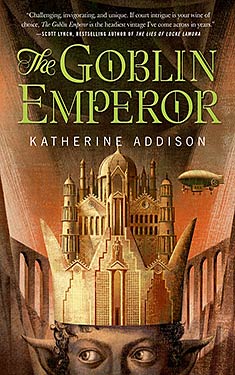Katherine Addison
Completed 5/18/2015, Reviewed 5/19/2015
5 stars
The Goblin Emperor is being nominated for awards all over
the place. It’s a fairly basic fantasy
plot of royal intrigue set in a steampunk-ish world of elves and goblins. An elvish emperor and his three eldest sons
die in a tragic dirigible accident.
Maia, the emperor’s fourth son and the product of a despised political
marriage to a goblin princess, unexpectedly assumes the throne of the elvish
empire at age 18. He is immediately met
with disdain and outright hostility.
Somehow, he must keep his sanity while navigating coup attempts and
murder plots to establishing himself as the rightful claimant to the
throne. What made this book stand out
for me was the world-building and empathy for Maia that Addison created. I loved Maia and related to his struggle for acceptance
in a cruel world.
 I was totally sold on Maia right from the beginning. His mother died when he was eight and was
left to be raised by a cruel guardian, himself exiled to this life of raising
the ignored, or more accurately, reviled son of the emperor. When Maia is suddenly thrust into his new
role, he simultaneously is relieved to be free of his abuser and terrified of a
role for which he was never groomed. He
has to learn all the ways of the royal court, discerning his friends and
enemies. I’ve never been one for the
complex politics often found in space opera and the like, and this book’s politics
gets quite complicated, but I found Maia’s journey entertaining and very endearing,
both in the successes and embarrassing faux pas (that’s the plural).
I was totally sold on Maia right from the beginning. His mother died when he was eight and was
left to be raised by a cruel guardian, himself exiled to this life of raising
the ignored, or more accurately, reviled son of the emperor. When Maia is suddenly thrust into his new
role, he simultaneously is relieved to be free of his abuser and terrified of a
role for which he was never groomed. He
has to learn all the ways of the royal court, discerning his friends and
enemies. I’ve never been one for the
complex politics often found in space opera and the like, and this book’s politics
gets quite complicated, but I found Maia’s journey entertaining and very endearing,
both in the successes and embarrassing faux pas (that’s the plural).
There was only one time I got lost in the politics, and it
highlights a part of the book that is both awesome and frustrating. Addison developed a highly complex language
of person and place names. Maia has the
easiest name. Nearly all the other names
are complicated and at times difficult to discern from one another. There are first and last names,
differentiation in last names based on gender and number, salutations based on
social rank, and given versus taken first names. Where I got completely befuddled was a dinner
scene with Maia and his cabinet discussing the current issues of state. If I really studied this, I believe it would
have been a great scene for understanding the personality and motivation of
each of the elf ministers. Instead, I
found myself rereading the same couple of pages over and over again, getting
the gist, but missing the depth. I did
well with most of the rest of the names, though often, when a previously
introduced character came into a scene, it took me a paragraph or two to
remember who exactly it was. The best
thing about the names was that I picked up the pronunciation quickly. She uses the same basic rules as Tolkien does
in his elvish.
I’ve read a lot of fantasy, though not much that had a lot
of court intrigue. I know it exists out
there. It made me wonder if the basic
plot of this book hadn’t been done many times before. But I think what makes this book standout is
simply the level of detail Addison created in the language, clothing, culture,
manners, and mythology. I’m betting this
will be the frontrunner for this year’s Mythopoeic Award.
But what set this book apart for me was the empathy which I
felt for Maia. I think that’s the
lasting impression I’ll have from reading it.
I so wanted him to succeed in the way he approached his relationships
and decision making. Every rejection he
gets is heart-breaking and every scene where a person begins to come around to
Maia’s side is exhilarating. And when
the book was done, I felt that I had just said goodbye to one of the warmest,
most deserving people I’ve ever met. Five
stars out of five.
i really enjoy reading your reviews. If i haven't read a book it gives me an idea of what to look for or to choose not to read the book. I i have already read the book your reviews frequently give me a new perspective or deeper understanding of what i read. Thanks Steve
ReplyDelete